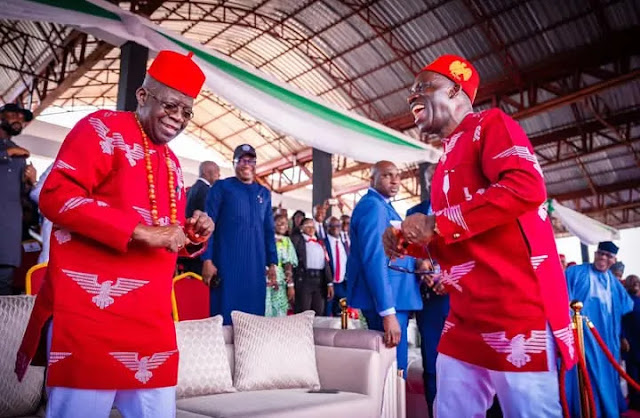Soludo’s Comments on Presidential Visits Spark Controversy Over Anambra’s Development Record
Governor Charles Soludo’s remarks during President Bola Ahmed Tinubu’s recent visit to Anambra State have triggered sharp reactions, as critics accuse him of distorting historical facts and undermining the achievements of his predecessors—particularly those of former Governor Peter Obi and former President Goodluck Jonathan.
Soludo, during a public address at the presidential event, stated that the last visit by a sitting president to Anambra was only to commission a brewery and other private investments. That assertion, described by many as a subtle jab at Peter Obi’s administration, has now come under scrutiny from those familiar with Anambra’s developmental trajectory.
Observers have pointed out that Soludo’s characterization not only misrepresents past presidential engagements in the state but also ignores the strategic approach taken by Mr. Obi to integrate private-sector investment into the broader framework of public development. According to Valentine Obienyem, who served as Special Adviser on Media to Peter Obi, the record is clear: Anambra under Obi welcomed numerous presidential visits, each marked by meaningful and transformational projects.
One of the most notable was President Goodluck Jonathan’s official working visit on October 15, 2010. Far from commissioning only private businesses, Jonathan inaugurated several cornerstone projects facilitated during Obi’s tenure. These included the Innoson Vehicle Manufacturing plant in Nnewi, Chukwuemeka Odumegwu-Ojukwu Teaching Hospital, Kenneth Dike Central Library, the newly constructed twin-building State Secretariat—the first of its kind in the state—and the Emergency Management Complex. He also oversaw the launch of Juhel Pharmaceuticals’ Parenteral Drug Factory and commissioned multiple roads across the state.
During a subsequent visit on August 30, 2012, President Jonathan again returned to Anambra to inaugurate key industrial and infrastructural assets. Among the projects launched were the Orient Petroleum oil drilling facilities in Aguleri-Out, and the Onitsha River Port Complex. Both developments were the product of extensive state investment under Obi’s leadership. These presidential visits also saw the opening of over 15 roads in the Onitsha Harbour Industrial Estate and facilities such as SABMiller Brewery (Intafact), Orange Drugs Company, Krisoral Company, and Brollo Steel Company—each of which has since played a significant role in Anambra’s economic ecosystem.
Soludo’s attempt to reduce the scope of these engagements to the mere commissioning of a brewery has been met with incredulity by those who witnessed or were involved in the initiatives. Critics argue that the dismissal of Intafact Brewery, in particular, betrays a lack of appreciation for one of Anambra’s most vital economic assets. As the state’s largest taxpayer and employer, the brewery stands as a monument to the sort of public-private synergy Obi championed.
Beyond economic projects, President Jonathan’s third and fourth visits during Obi’s governorship were driven by humanitarian and cultural imperatives. He visited to assess flood damage and show solidarity with affected communities, and later returned to attend the funeral of the revered statesman Dim Chukwuemeka Odumegwu-Ojukwu.
President Jonathan’s fifth visit on March 10, 2014, marked a historic moment when he officially flagged off the construction of the Second Niger Bridge—a N117 billion project. Speaking at the time, Jonathan commended Peter Obi’s relentless efforts to get the project off the ground and acknowledged his role in selecting a top-tier contractor, Julius Berger, to ensure quality delivery.
Peter Obi’s development philosophy, Obienyem explains, placed deliberate emphasis on private investment. He believed real economic growth hinged on active private-sector participation, supported by government-provided infrastructure. This approach was aimed at attracting long-term investments that would continue to fuel employment and revenue long after public ceremonies ended.
Soludo’s controversial remarks have also reignited debates about the nature of political endorsements in the South-East. During his address, Soludo referenced the region’s support for President Jonathan in 2011, suggesting a lack of critical engagement by local leaders. However, analysts argue that the decision not to field a candidate in that election was a strategic one, intended to position the region for future federal partnerships. They also point to Soludo’s silence on the more contentious endorsement of President Muhammadu Buhari in 2015 and 2019—decisions which were far more divisive within the region.
Other presidential visits to Anambra, such as those by former President Olusegun Obasanjo in 2006 and 2007, further weaken Soludo’s claim that Anambra saw little or no federal attention during the Obi era. Obasanjo was present to commission numerous projects including the Onitsha Business Park, Revenue House in Awka, and the Anambra State Fire Service Headquarters. He also launched key roadworks like the Awka–Nibo–Nise–Enugwu-Ukwu ring road.
Even areas currently under redevelopment owe much to past groundwork. The amusement park commissioned during President Tinubu’s recent visit, for example, was once a flood-prone wasteland. Its transformation only became possible after Peter Obi intervened to reopen the clogged water channel, construct a culvert, and make the area viable for future infrastructure.
Rather than using President Tinubu’s visit to spotlight Anambra’s potential and attract future investments, critics believe Governor Soludo chose to pursue a political agenda that undermines rather than uplifts. His remarks, they argue, do a disservice not only to his predecessors but also to the people of Anambra, whose memories and lived experiences contradict his version of history.
As attention now shifts to whether President Tinubu will deliver on the promises made during his visit, many are calling on state leaders to adopt a more inclusive and truthful approach to governance—one that respects history, celebrates progress, and prioritizes the well-being of Ndi Anambra above political point-scoring.
Facts, they say, are sacred. And when preserved accurately, they serve as both inspiration and blueprint for the future.













![Content Creator Angelica Kelechi Speaks Out on Alleged Sexual Assault at Khloe Abiri’s Spa [VIDEO]](https://blogger.googleusercontent.com/img/b/R29vZ2xl/AVvXsEgQStip4cn2DAOvQ2hNFU30OAFWoxfQIDOnStd0uVgwwxKrFAQYYvtFni6QV04OGP8dyKk5TCAhXM5es9linl1ClhjPzaazz2tTt0LmJ5lFVe5202o2McF9QROT1v2hEyNTdY-M1KRuLTY6OqqysKNfcsY5bCtwCIP8wEQ4AXcfQfTaXWWZiixqf82NDH5a/w72-h72-p-k-no-nu/abiri-khloe123.jpg)

![Bello El-Rufai Questions Discrepancy As Boko Haram Terrorist Gets 20Years While Nnamdi Kanu Receives Life Sentence [VIDEO]](https://blogger.googleusercontent.com/img/b/R29vZ2xl/AVvXsEiWSu8zIQCe1XyQUKpvkUYY03fJRFWUlJkrlvEZioStBVV0gT0uVjMg64uBqblrA0aTyaQ4RD8mhelxNq7VGPBtsNFzDl9sS880MvdKXa2d964PDDf9atDRlVMzCw2qE7vtqGj1NNyq2IVC6d3c4qqdeGP6QgwPUInkpB3rWonFU75SMJfs-ql5uH7IzchQ/w72-h72-p-k-no-nu/Bello-El-rufai1123.jpg)




0 Comments
Hey there! We love hearing from you. Feel free to share your thoughts, ask questions, or add to the conversation. Just keep it respectful, relevant, and free from spam. Let’s keep this space welcoming for everyone. Thanks for being part of the discussion! 😊